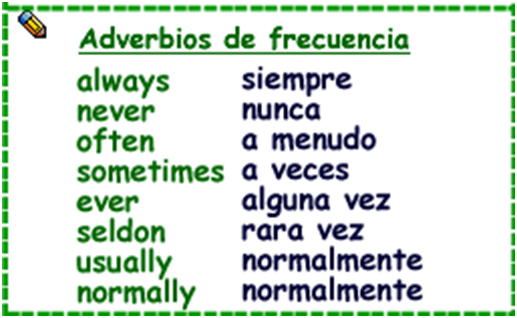Adverbs are words that modify verbs, adjectives, or other adverbs. Here we've rounded up a list of common Spanish adverbs of frequency. They may come in handy if you want to describe how often an action is done or when you do certain things. You will also learn where to place adverbs in Spanish. You can also use our Spanish dictionary to look up words in Spanish and English.
Common Spanish adverbs of Frequency - Adverbios de frecuencia
- Siempre - always
- Casi siempre - almost always
- Constantemente - constantly
- A menudo - often
- Frecuentemente / Con frecuencia - frequently
- Mucho / Muchas veces - often, a lot, many times
- Todos los días - every day
- A diario - daily, every day
- Diariamente - daily
- Semanalmente - weekly
- Mensualmente - monthly
- Anualmente - annually
- Normalmente - normally
- Generalmente - generally
- Regularmente - regularly
- Usualmente - usually
- A Veces - sometimes
- Ocasionalmente - occasionally
- en Ocasiones - sometimes, occasionally
- De vez en cuando - From time to time
- Poco / Pocas veces - seldom, few times
- Rara vez - hardly ever
- Casi nunca - rarely
- Apenas - scarcely, hardly ever
- Nunca / Jamás - never
- Nunca Jamás - never ever
- Poco - a little
- Menos - less
See also: Telling time in Spanish

Other common expressions:
If you want to describe the number of times you do something over a given period of time, you can use the form below:
Number of times you do the action + Vez / Veces + al (if the following noun is masculine) / a la (if the following noun is feminine) + Period of Time
Note: Vez is used for the action that is only done once.
For examples:
Yo como tres veces al día - I eat three times a day.
Hago ejercicios cuatro veces a la semana - I exercise four times a week.
Viajo a España una vez al año - I travel to Spain once a year.
Cada + time expressions = every + time expressions
For examples:
Almuerzo en ese restaurante cada domingo - I have lunch at that restaurant every Sunday.
Tómate la pastilla cada ocho horas - Take the pill every eight hours.
Placement of Adverbs
The position of an adverb depends on the word it is modifying.
- An adverb often goes after the verb it modifies.
For example: Cantas bien - You sing well.
- An adverb often goes before the adjective it modifies.
For example: Tu hijo es muy alto - Your son is very tall.
- An adverb often goes before the adverb it modifies.
For example: Hablas demasiado rápido - You speak too quickly.
- Generally, adverbs of frequency will be placed at the beginning or at the end of a sentence as it modifies the whole sentence.
If you want to know how to form an adverb in Spanish, you can read this article: Formation of adverbs in Spanish.
Let's take a look at some examples below:
Siempre tengo hambre - I am always hungry.
Escucho música con frequencia - I listen to music frequently.
Me visto de negro muy a menudo - I dress in black very often.
Me ducho a diario - I take a shower daily.
Estudio español semanalmente/cada semana - I study Spanish weekly/every week.
Normalmente me levanto a las seis - I normally get up at six.
Vengo poco por aquí - I seldom come here.
Nunca jamás volvería con él - I would never ever go back to him.
